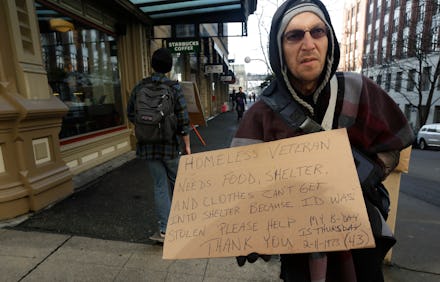3 ideas to fight global and US poverty are gaining traction

Feeling bummed out about the new study showing growing income inequality in the United States — with half the country going without a raise since 1980?
Buck up.
Here are three big wins this week for those fighting on behalf of the economically underprivileged.
Portland, Oregon, will tax companies with overpaid CEOs to support the homeless.
On Wednesday, the city council of Portland, Oregon, passed a new measure aimed at stemming income inequality: taxing disproportionately well-compensated CEOs, the Portland Business Journal reported.
According to the Guardian, it's the first measure of its kind, and would basically add a surcharge of 10% to a company's corporate tax if the firm has a CEO-to-worker pay ratio above 100.
In other words, if a CEO makes more than 100 times the median worker pay at the business — a figure the Securities Exchange Commission requires all publicly traded companies to disclose — then the firm has to pay an extra tax.
The money raised will go to support the city's homeless, although it's unclear if Portland's Mayor-elect Ted Wheeler will support the measure, as current Mayor Charlie Hales does.
As many as 540 public companies operations in Portland will be subject to the tax, meaning that the law could raise as much as $2.5 million a year.
Researchers showed giving low-income people cash might just work.
One of the most efficient ways to help alleviate poverty is, perhaps unsurprisingly, just giving broke people straight cash.
That idea has long met resistance — from both the right and left — because of concerns that low-income people will then be more likely to buy alcohol, cigarettes and other so-called "temptation goods," as opposed to education and self-improvement.
Turns out, the opposite is actually true.
That's according to new research from economists at Stanford University and the World Bank looking at 30 studies of unconditional cash transfers in Latin America, Africa, and Asia.
Economists found that unconditional grants of cash made people less likely — not more likely — to spend their money on so-called "temptation goods" than people who did not receive money.
There's a few theories as to why this happens: One, is that cash grants make the prospect of self-improvement seem less futile, which creates an incentive to cut back on the sauce if it means having more money to send your kids to school.
Another theory is that grants usually go to women, which increases their economic power in the household, leading to more money getting spent on the family.
A group of think tanks and benefactors just donated $10 million to study universal basic income.
One idea that's increasingly getting traction as a way to fight rising income inequality is the idea of a universal basic income.
The notion is that everyone in a given country gets enough money each year in the form of a stipend to cover their basic expenses: Over the summer, for example, a proposal to institute a universal basic income in Switzerland of roughly $2,555 a month actually garnered enough signatures to prompt a referendum — although the measure was eventually rejected.
Despite that setback, the idea is still gaining traction across Europe. Both Finland and the Netherlands have pilot programs set to kick off in 2017.
But support for a UBI is not just popular in Europe.
On Thursday, a group of think tanks and benefactors launched the Economic Security Project, which will dole out $10 million in grants over two years to experiments studying how to implement a universal basic income in the U.S.
Now — hopeful news for poverty-fighters aside — there's still plenty of work to be done.
Just because there's evidence that giving cash grants to low-income people is a good idea, doesn't mean governments will actually start doing it any time soon.
And only time will tell if Portland's CEO measure will be successful — and if the city's incoming mayor will support it.